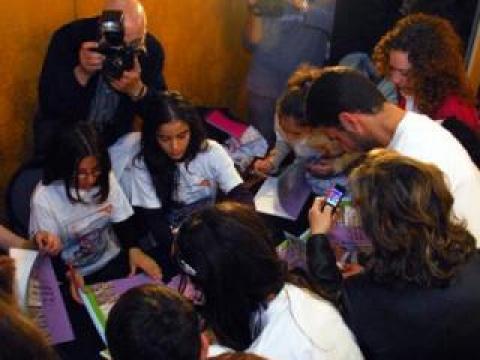Raising awareness through the eyes of children

Four children among 30 present at the launch spoke about their expectations before the media, public and leaders.
They don’t know for example that they don’t have to go to war if they are under 18 “A lot of children do not even know what their rights are,” said 11-year-old Tracey Hamzo. “They don’t know for example that they don’t have to go to war if they are under 18 and my story [in the book] talks about that.”
“This book is a message to adults to let them know that we [the children] are a very important part of the community. We are the future, and we should defend our rights,” said 14-year-old Youhanna Abou Khazen.
For eight weeks, the 32 children, aged nine to 17, attended weekly workshops to acquire writing and photography skills and learn about their rights. Children wrote personal stories to express their viewpoints and they also wrote letters to stakeholders and the public in support of children’s rights.
“Children found their way to put in writing the themes that concern them and they did it with such an amazing style and passion,” said Patricio Cuevas-Parra, World Vision Lebanon Advocacy Manager. “Our hope is that this book will be pivotal in raising awareness of Lebanese citizens about the necessity of dialogue on child rights.”
...children are not just passive beneficiaries of our aid. They are powerful partners with whom we must engage “Increasingly World Vision has come to understand that children are not just passive beneficiaries of our aid. They are powerful partners with whom we must engage if we are to produce positive and lasting change,” said Perry Mansfield, World Vision Lebanon National Director.
The book was born out of the Children’s Council; a three-year project implemented by World Vision which aims to equip children with tools, knowledge and skills to involve them in influencing their communities and peers to contribute to a more just, peaceful and tolerant society.
-Ends-
They don’t know for example that they don’t have to go to war if they are under 18 “A lot of children do not even know what their rights are,” said 11-year-old Tracey Hamzo. “They don’t know for example that they don’t have to go to war if they are under 18 and my story [in the book] talks about that.”
“This book is a message to adults to let them know that we [the children] are a very important part of the community. We are the future, and we should defend our rights,” said 14-year-old Youhanna Abou Khazen.
For eight weeks, the 32 children, aged nine to 17, attended weekly workshops to acquire writing and photography skills and learn about their rights. Children wrote personal stories to express their viewpoints and they also wrote letters to stakeholders and the public in support of children’s rights.
“Children found their way to put in writing the themes that concern them and they did it with such an amazing style and passion,” said Patricio Cuevas-Parra, World Vision Lebanon Advocacy Manager. “Our hope is that this book will be pivotal in raising awareness of Lebanese citizens about the necessity of dialogue on child rights.”
...children are not just passive beneficiaries of our aid. They are powerful partners with whom we must engage “Increasingly World Vision has come to understand that children are not just passive beneficiaries of our aid. They are powerful partners with whom we must engage if we are to produce positive and lasting change,” said Perry Mansfield, World Vision Lebanon National Director.
The book was born out of the Children’s Council; a three-year project implemented by World Vision which aims to equip children with tools, knowledge and skills to involve them in influencing their communities and peers to contribute to a more just, peaceful and tolerant society.
-Ends-
Share